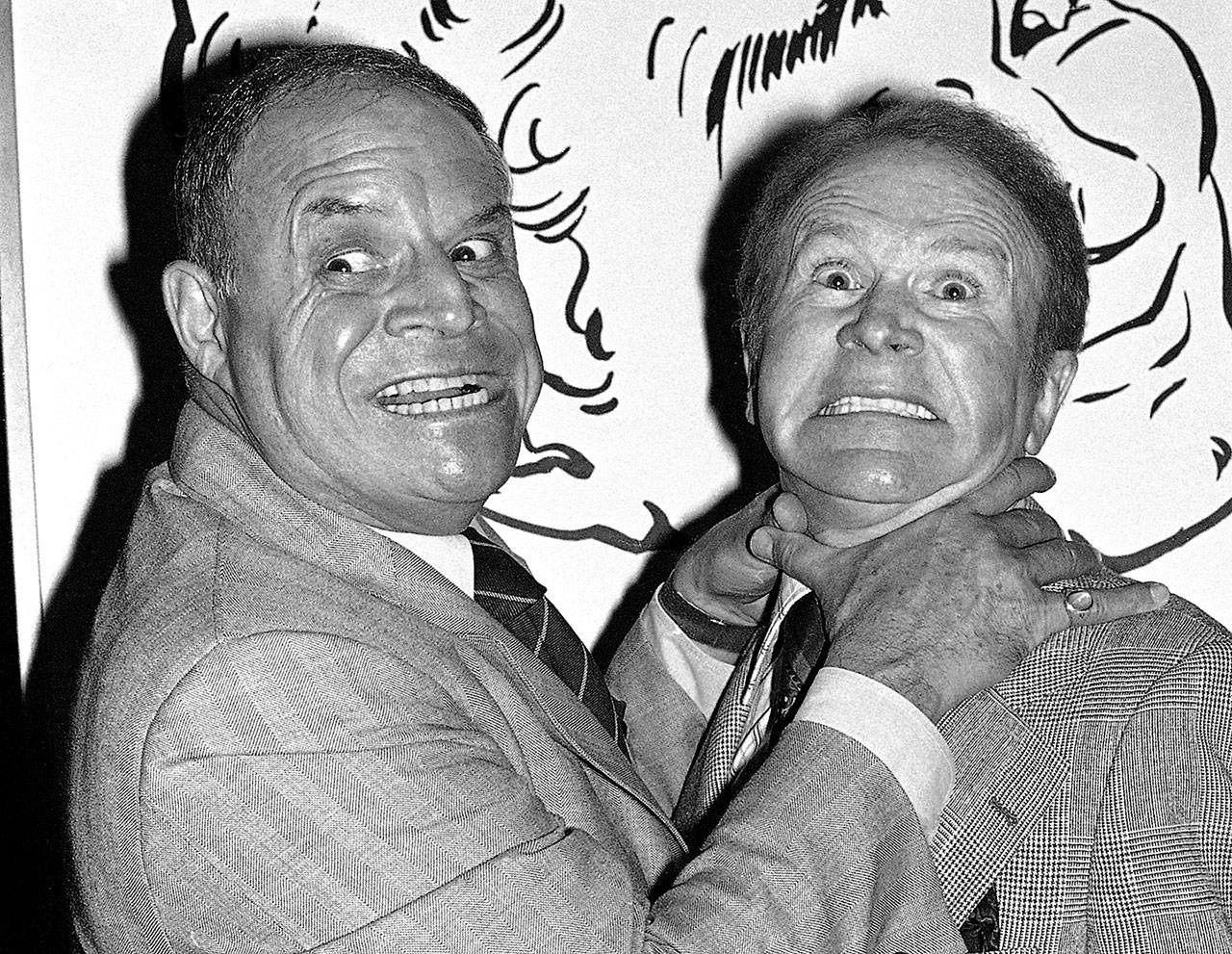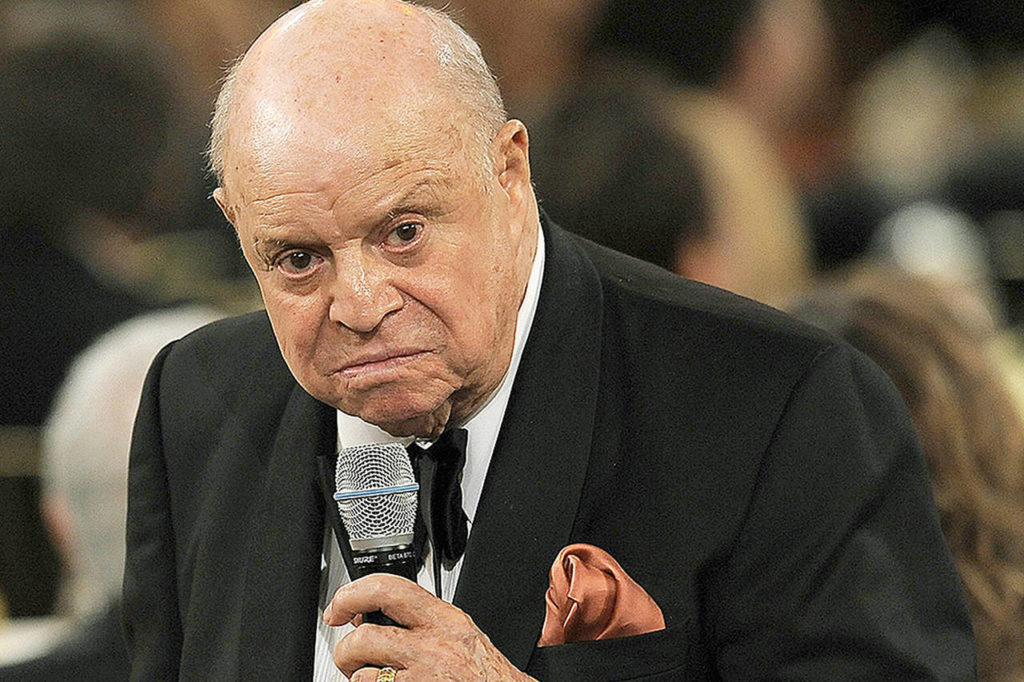By Matt Schudel / The Washington Post
Don Rickles, the irrepressible master of the comic insult whose humor was a fast-paced, high-volume litany of mockery in which members of his audience were the (usually) willing victims of his verbal assaults, died April 6 at his home Los Angeles. He was 90.
The cause was kidney failure, said his publicist, Paul Shefrin.
When Rickles developed his stand-up act in the 1950s, his humor was considered shocking, with a raw, abrasive, deeply personal edge. If he wasn’t the first “insult comic,” he was by far the most successful and most widely imitated, becoming a fixture on television and in nightclubs for decades.
Trained as a dramatic actor, Rickles appeared in films and television series and was the voice of Mr. Potato Head in the popular “Toy Story” series of animated features from 1995 to 2010. But for more than 50 years, he practiced a distinctive brand of improvisational, sarcastic humor that made him one of the most original and influential comedians of his time.
His brash, snappish style became a major influence on many younger performers, including comedians Louis CK, Lewis Black and Zach Galifianakis, radio shock jock Howard Stern and even the writers of the mouthy cartoon character Howard the Duck.
People vied for front-row seats at nightclubs, practically begging to be skewered by Rickles, who was variously known as the Merchant of Venom, the Sultan of Insult or, as “Tonight Show” host Johnny Carson dubbed him in ironic endearment, Mr. Warmth.
No one was spared from his hectoring, whether celebrities, royalty, presidents or, especially, Rickles himself. His reputation was established in 1957, when he noticed the often-combative Frank Sinatra in the audience at a nightclub in Miami Beach.
Mr. Rickles poked fun at a recent movie Sinatra had made, then said, “Hey, Frank, make yourself at home. Hit somebody!”
Sinatra burst out laughing, became one of Rickles’s biggest supporters, and a career was launched.
Rickles did not tell jokes with traditional punch lines, did not make topical comments about the news and did not use crude profanity. Every show was spontaneous, built largely around his caustic observations about members of the audience.
“There’s something truly artful about his delivery,” director Martin Scorsese — who hired Rickles to play a Las Vegas casino manager in the 1995 film “Casino” — once told the New York Times.
“Many other comedians who practice insult humor are either way too broad or they hide behind a character,” Scorsese added, “but Rickles keeps this balance between levity and relentlessness. And it’s all improvised, which is really the hardest thing to do, and he makes it look like the easiest, most graceful thing in the world.”
Short, bald and stocky, Rickles walked on the stage “looking like a snapping turtle surfacing in a pond,” as a New Yorker profile put it in 2004. He glanced around the room at his prey. Overweight people, men accompanied by younger women, racial and ethnic minorities — all were subject to his relentless barrage of smart-aleck buckshot.
Rickles’ chief comedic weapons were exaggeration and ridicule, deployed in a rapid, sharp-tongued style that stacked one quip on top of another until audiences were helpless with laughter. He especially delighted in tweaking the rich and mighty and became renowned for his biting performances at celebrity roasts.
“The bigger a person is,” Rickles told the Newark Star-Ledger in 1993, “the more pleasure I take in knocking them down a notch.”
At a tribute to Clint Eastwood, Rickles said, “Clint, I’m sorry, but I just gotta say what’s on everybody’s mind here tonight: You’re a terrible actor.”
While filming “Casino,” Rickles decided to needle the film’s star, Robert De Niro, who had twice won Academy Awards.
“They warned me what a serious guy De Niro is,” Mr. Rickles told the New York Daily News. “They warned me not to make jokes. So the third day of shooting, I looked him straight in the face and told him: ‘I can’t work with you. You can’t act.’ The guy fell on the floor. He didn’t stop laughing for 18 weeks. Scorsese fell on the floor too, but he’s so small we couldn’t find him.”
Rickles developed a persona that was a carefully crafted combination of cocksure wise guy, playground bully and naughty, insecure child who just pulled the dog’s tail. In the 1950s, he was working in Washington, D.C., at a cramped strip club called the Wayne Room when he hit on a formula that became his stock-in-trade: He became a heckler from the stage.
“The place was like a hallway,” he recalled in a 1977 Washington Post interview. “The customers were right on top of you, always heckling, and I began giving it right back to them.”
The secret of his comedy was in his delivery, which was a blizzard of mockery, raillery and mayhem. His all-purpose put-down for dolts was to call them “hockey puck.”
He often mentioned his Jewish background, his mother and his wife, Barbara, for comic effect, as one sharp-edged observation collided with another in madcap verbal detonations.
During a live 1968 performance at the Sahara in Las Vegas, every element in Rickles’ comic arsenal was on display when he discovered that an audience member was Lebanese:
“God put us on this earth to laugh. Am I right? He made you a Lebanese? He made me a Jew. So what?
“What’s your first name? Mohammed? Habib?
“I’ve met you before, haven’t I? That’s right, you hung my uncle. … Where’d I meet you, Habib? Lake Tahoe, that’s — Barbara was pregnant. Are you the guy that made my wife pregnant?
“How do you like that? My kid’s an Arab.”
Rickles seldom used language that would have to be censored on television, but many people considered his humor brazen and in poor taste, especially early in his career. As time went on, his style seemed caught in a sometimes uncomfortable time warp.
Long after it was considered insensitive or worse, Rickles used outmoded stereotypes to mock women and practically every conceivable ethnic group. He continued to appear on late-night talk shows and in nightclubs into his late 80s.
In 1998, Washington Post television critic Tom Shales spent a weekend attending Rickles’ performances at a nightclub in Atlantic City.
“On a giant stage,” Shales wrote, he was “much more complex and poignant than the loudmouthed guy who guests on the talk shows. . … Rickles seemed mythic, timeless, fearless — endowed by the gods with some absurd miraculous gift.”
Although he disliked the term “insult comedy,” Rickles knew that insults were what his audiences came to expect.
“I have this gift for saying things with a certain attitude, walking a very fine line with that attitude and staying on the right side of it,” he told the Star-Ledger in 1993. “But it’s always a gamble. Sometimes it’s tough to judge whether you’re about to cross that line.”
He often turned nervously away from the butt of his jokes to address the rest of his audience in mock fear: “Is he laughing? Take a look, is he laughing?”
Donald Jay Rickles was born May 8, 1926, in Queens. His father, who sold insurance, had an acerbic sense of humor, but it was his mother who encouraged him to stand up at family gatherings and poke fun at his uncles.
During World War II, Rickles served with the Navy in the Philippines, which he often referred to in his comedy act. After the war, he studied for two years at the American Academy of Dramatic Arts, where his classmates included Anne Bancroft, Grace Kelly and Jason Robards.
“Most of these people were dedicated actors,” he told The Post in 1977. “You had to do all these improvisations. The teacher would say, ‘We are two moths on a curtain.’ I was always in trouble because I was always doing the jokes. I said, ‘What do I have to do, eat the drapes?’”
While looking for work as an actor, he sold used cars, life insurance and pots and pans. Almost out of desperation, he turned to comedy, billed in the early 1950s as Don “Glass Head” Rickles.
By the late 1950s, he was appearing in Las Vegas, while still finding occasional work as a dramatic and comic actor. He was in the 1958 submarine movie “Run Silent, Run Deep” with Clark Gable and Burt Lancaster. He played a nightclub bouncer in “The Rat Race” (1960), alongside Tony Curtis and Debbie Reynolds. He was in two Annette Funicello-Frankie Avalon beach movies in the mid-1960s, and in 1970 played a supply sergeant-con artist in “Kelly’s Heroes,” starring Eastwood.
Rickles appeared in dozens of sitcom episodes, from “The Dick Van Dyke Show” to “Gilligan’s Island,” and starred in several short-lived comedy shows of his own, the best-known of which was probably “C.P.O. Sharkey,” in which he played a Navy noncommissioned officer for two seasons on NBC in the 1970s.
In spite of his many forays into acting, Rickles was always at his best alone on stage, armed only with a microphone and his wit.
For years, until he got married at 38, Rickles lived with his mother. She then moved into the adjoining apartment. Survivors include his wife of 52 years, the former Barbara Sklar, of Los Angeles; a daughter, Mindy Mann; and two grandchildren. A son, Larry Rickles, a TV comedy writer and producer, died in 2011.
Rickles’ closest friend in show business was comedian Bob Newhart, whose mild, cerebral style of humor could not have been more different.
“There’s a part of all comedians that remains a child, while other people get civility pounded into them,” Newhart told The Washington Post in 2007. “But somehow comedians don’t. This is particularly evident in Don. Whatever he sees, he says. And it’s what we all think, but we’re too civilized to say.”
Talk to us
> Give us your news tips.
> Send us a letter to the editor.
> More Herald contact information.


























